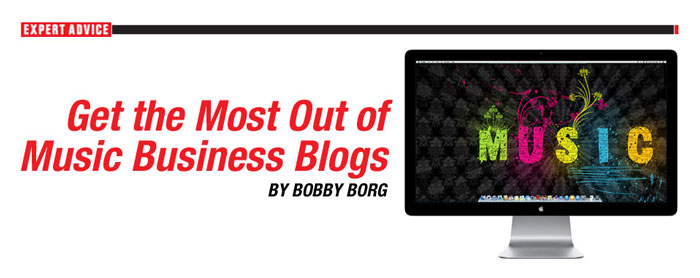
You surf the web from one music business blog to the next, scrolling through a variety of tips and articles. But just how productive are you being? Find out by reading these 10 helpful tips.
1. Choose Trusted Sources. Seek out quality blogs where you can be assured that experienced authors and editors are striving to release well-written, objective information that is not manipulated only to promote their own cause. Try Billboard, Wired, MusicConnection.com, DIY Musician Blog and Leftsetz Letter.
2. Read Thoroughly. According to an article by Jakob Neilsen posted by Neilsen Norman Group (nngroup.com/articles/how-users-read-on-the-web), people rarely read Web pages word-by-word; instead, they scan pages, picking out individual words and sentences. While this might be suitable for articles written in a specific style, I have personally found it to be detrimental to some of my students, who often misinterpret key points. To truly benefit from blog posts and from the time you invest online, read the articles from beginning to the end, consider the tone of the author and evaluate objectively what the article is really all about.
3. Consider the Intended Audience. While it never hurts to review practical sound advice, spend your valuable time reading articles that are really intended for you. Pay attention to the title of an article, the target audience of the blog and the opening paragraph of an article. While this might seem like common sense, I’ve observed that sense isn’t always so common. I’m always blown away when someone comments on an article with “great advice, but only if I were a beginner,” when the article is titled “10 Tips to Starting Your First Band.”
4. Seek to Learn. Assuming that you value your time and energy and you have a positive outlook on life, always strive to take away something useful from each and every blog article you read. The music industry is very complex—and as history as shown us time and time again—there are more methods to achieving success than just the ones that you believe in and have executed successfully. Keep an open mind and you’re likely to pick up a few new skills!
5. Follow the Article’s Links. Good articles usually have one or two links where you can obtain further information on a specific point. While you can’t spend all day online, be sure to click on at least one or two of the links so that you can verify the information you are reading and get a deeper understanding of the topics. You’ll be glad you did.
6. Comment Critically. Reflecting on a blog post and offering your own opinion helps to strengthen what you’ve learned, but just be sure to express it critically and offer something of value for all to further benefit. Writing critically involves two steps: First show that you understand what the author is saying, and then express your own argument. Be sure to refer specifically to the text to which you are referring, back-up what you have to say with links to trusted articles and journals, and leave your real name and email for those who might like to further converse on the matter. To read more about writing critically, check out this white paper from the University of Washington: depts.washington.edu/pswrite/Handouts/CriticalAnalysisPapers.pdf.
7. Give Back Rather Than Hijack. While on the topic of posting comments, let’s discuss hijacking—the process of stealing the spotlight away from certain blog posts to sell your own services or agenda. Some marketers say that this is a fair-game (albeit aggressive) method of marketing, but did you know that you can utilize blogs to get more marketing bang for your time and energy? That’s right! You can write your own articles, be seen as a thought leader, and own your own audience. Many of the blogs that you read are usually looking for guest bloggers just like you? Seriously! So why not just contribute your own articles and be the star? Show us how smart you are and how wonderful your service is. To read more on the dark art of hijacking, visit bandt.com.au/marketing/battle-brands-behind-hijack.
8. Quit Trolling and Wasting Your Time. Sadly, the web is loaded with angry people looking for any chance to vomit their bitterness on others, and they usually do this while hiding behind goofy usernames like Jack Hoff or InternnetHater666. If this is you, why not put all you energy and fire into something more productive like “fixing” the music industry and all you hate about it. Maybe you can use the various blog articles you read as inspiration to publish your own book or innovate a solution to all the problems of the world. Seriously! You can do it! We’re all rooting for you and you’ll use your precious time on this earth more productively and make the Web or more enjoyable place for all. For more information on why people troll, see this article published by Psychology Today: psychologytoday.com/blog/better-living-technology/201408/why-the-online-trolls-troll.
9. Use What You Learn. Reading all of the blog articles and tip columns in the world won’t do anything for you if you don’t put the information to good use. Information is only as good as your desire to execute it. Don’t wait for tomorrow to do what you can do today. Roll up your sleeves and get to work on doing a few of the cool things that you’ve read in the last week.
10. Show Appreciation. Finally, to help you get the most out of blog articles and tips on the web, why not start by thanking the authors and letting them know you appreciate their time and effort. The average blog article can take anywhere from one to three hours to write, and yet it generates zero compensation! Yup, that’s right! Many bloggers work for nothing! Surely, they benefit by strengthening their brands and generating attention to their other services, but I’ve seen great bloggers quit because they failed to see this value. You won’t like everything that you read, but thanking the occasional blogger will certainly incentivize him or her to continue posting the quality, free advice that you need to succeed in this lovely business of music.
By Bobby Borg
BOBBY BORG is the author of Music Marketing For The DIY Musician: Creating and Executing a Plan of Attack On A Low Budget (Sept. 2014). The book is available on the Hal Leonard website under “Trade Books” bit.ly/1po5FyO (ISBN: 9781480369528), AMAZON amzn.to/X4Fwst, or Bobby Borg (bobbyborg.com).








